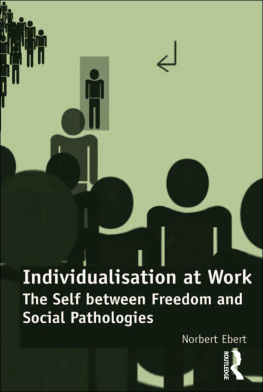INDIVIDUALISATION AT WORK
To Maria Markus and Michael Pusey
Individualisation at Work
The Self between Freedom and Social Pathologies
NORBERT EBERT
Macquarie University, Australia
First published 2012 by Ashgate Publishing
Published 2016 by Routledge
2 Park Square, Milton Park, Abingdon, Oxon OX14 4RN
711 Third Avenue, New York, NY 10017, USA
Routledge is an imprint of the Taylor & Francis Group, an informa business
Copyright Norbert Ebert 2012
Norbert Ebert has asserted his right under the Copyright, Designs and Patents Act, 1988, to be identified as the author of this work.
Cover design by Anna Lena Kuhn.
All rights reserved. No part of this book may be reprinted or reproduced or utilised in any form or by any electronic, mechanical, or other means, now known or hereafter invented, including photocopying and recording, or in any information storage or retrieval system, without permission in writing from the publishers.
Notice:
Product or corporate names may be trademarks or registered trademarks, and are used only for identification and explanation without intent to infringe.
British Library Cataloguing in Publication Data
Ebert, Norbert.
Individualisation at work : the self between freedom and social pathologies.
1. Individualism. 2. Socialization. 3. Industrial sociology.
I. Title
302.54dc23
Library of Congress Cataloging-in-Publication Data
Ebert, Norbert.
Individualisation at work : the self between freedom and social
pathologies / by Norbert Ebert.
p. cm.
Includes bibliographical references and index.
ISBN 978-1-4094-4266-0 (hbk) -- ISBN 978-1-3155-8840-7 (ebook)
1. Individualism. 2. Individuation (Psychology) 3.
Organizational sociology. I. Title.
HM1276.E24 2012
302.54--dc23
ISBN 9781409442660 (hbk)
ISBN 9781315588407 (ebk-PDF)
ISBN 9781317117124 (ebk-ePUB)
Contents
Preface
The changing relationship between individual and society lies at the very core of Sociology as a discipline. The most recent changes in the nature of this relationship have been described as individualisation. Although individualisation has been and still is hotly debated in Sociology a fundamental issue persists: the concept remains vague. As a consequence, individualisation is in theoretical as well as empirical studies often reduced to mean atomisation, self-realisation or social isolation. Sociological debates of individualisation all too often take individual claims for self-realisation as their starting point. Individualisation is, however, a social phenomenon, not an individual one. In this book I seek conceptual and theoretical clarity and depth by distinguishing three social aspects of individualisation: structural individualisation, normative individualisation and organised individualisation. It provides empirical evidence on the basis of qualitative interviews. I refer to those aspects of individualisation as social as they do not originate in the individual but in individuals interactions; they are neither just individual nor just social. It is in the social sphere where individualisation is at work enabling social freedoms, while equally being at risk of developing social pathologies.
Given the pace of social change in late modern societies, sociological analyses are always at risk of lagging behind. Investigations like this one, therefore, are intrinsically at risk of being nothing but a sociological snapshot of social conditions in a fast changing world. Yet, this study is premised on something that I believe runs deeper than a look at those fleeting fashions to which sociology and even this book is by no means immune. This fundamental premise is the belief that human beings are able to build and sustain a social order that allows them to spread the wings of their emancipatory capacities in a way that does justice to their own human nature. Given the plurality and diversity of human beings, I have no doubt that this is an inherently difficult and open-ended task, a task that is never going to be completed, yet one that is worth pursuing. As a matter of fact, it is the social dynamics of organising this pursuit that allow individuals to be at their best as creative and reasoning beings. Therefore, the reflections presented in this book, theoretical as they may be, have their starting point in individuals practical experiences of everyday social interactions. This is important, since the normative critique of contemporary individualisation that I present is not intended to identify pathologies in individuals abilities to be ever more individualistic rational actors. The potential pathologies that I want to bring to the fore are social pathologies that have their origins in deficient modes of normative integration. Without hesitation, I admit that my investigation is to a large degree driven by the hope that a moral culture could be so constituted as to give those affected, disrespected and ostracised, the individual strength to articulate their experiences in the democratic sphere (Honneth 1994: 269).
Writing a book can in itself be a very individualising challenge. Trying to find words to thank those who have been on my side during an exciting and challenging task, I realise that I cannot but fail in finding the right ones. Above all, I deeply thank Maria Markus and Michael Pusey for their extraordinary wisdom and guidance. I cannot possibly do justice to the seeds of respect, trust and knowledge you have patiently, carefully and generously nurtured in me when I was bare of understanding. Over the years this project has taken me much further than Down Under. I am humbled by the generous friendships and collegiality that surround me. This goes for the whole Department of Sociology at Macquarie University in Sydney. My debt is particularly great to my friends and colleagues Harry Blatterer for reading through large parts of the manuscript, to Selvaraj Velayutham who persistently and patiently reminded me to get started in the first place and to Shaun Wilson for listening and encouraging me on many train trips home. Above all, however, I am grateful to and hold great respect for my colleague and friend Pauline Johnson. This book would not have come true without the determination with which she builds and guides the department. Lucian Daniel Kafka and Benjamin Mudaliar are probably both completely unaware of the enormous contributions they have made to this book which is all the more reason to thank them both for cordial friendships. Last but not least, I am grateful to my dear brothers, the Fab Five of Lrrach, you are fabulous indeed. That is where I belong.
Sydney, January 2012
Introduction
In the article Freedom and the Individual, originally published in 1913, Georg Simmel wrote:
The general European consensus is that the era of the Italian Renaissance created what we call individuality. By this is meant a state of inner and external liberation of the individual from the communal forms of the Middle Ages, forms which had constricted the pattern of his life, his activities, and his fundamental impulses through homogenising groups. These had, as it were, allowed the boundaries of the individual to become blurred, suppressing the development of personal freedom, of intrinsic uniqueness, and of the sense of responsibility for ones self. (1971: 217)







